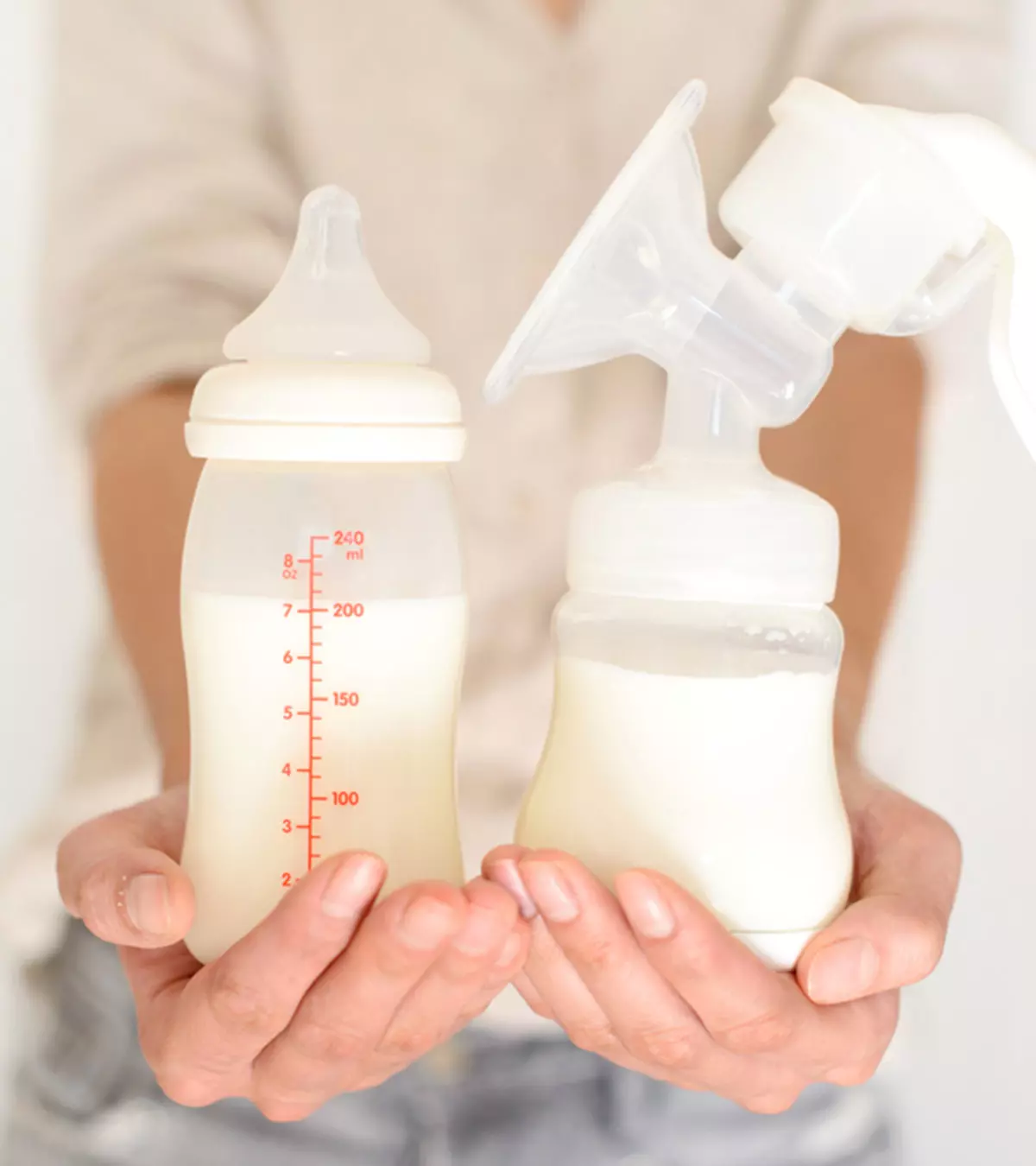
Image: Shutterstock

Doctors advocate taking different health supplements during pregnancy; however, there are various supplements that you may continue to take while nursing. Consuming fish oil during breastfeeding is an example of such a health supplement.
Continue reading this post if you’re considering taking fish oil as a supplement but aren’t sure if it’s safe to use while nursing. This post discusses fish oil’s safety profile and health advantages for both mother and baby.
Key Pointers
- Fish oil contains potent omega-3 fatty acids that can enhance baby growth and development.
- Consuming fish oil while breastfeeding can supplement breastmilk with additional nutrition.
- Fish oil is usually safe during pregnancy, but individuals with bleeding disorders, diabetes, and certain health issues should avoid it.
- Excess intake of fish oil while breastfeeding can have adverse effects.
- It is advisable to consult a doctor and regulate dosage accordingly.
Is It Safe To Consume Fish Oil During Breastfeeding?

Image: Shutterstock
Both you and your baby can have many benefits if you consume fish oil while you are still breastfeeding. Fish oil contains omega 3 fatty acids such as DHA, which get absorbed in your breast milk and are carried through to your baby when you are breastfeeding him. You can safely consume fish oil if you are not allergic to fish or fish based products like fish oil and other omega 3 fatty acids (1).
How Does Fish Oil Benefit My Baby?
Omega 3 fatty acids contain a good amount of DHA, which is extremely important for your baby’s development, growth, and nutrition. DHA helps in boosting the development of your baby’s cognitive function and social skills, as well as language skills. It helps strengthen their immune system and digestive system. DHA plays an important role in keeping your baby’s skin healthy and supple and also aids vision development (2).

Image: Shutterstock
Essential fatty acids (EFA) help in the production of prostaglandins. These combat inflammation in the body. It also improves immunity. The essential fatty acids support overall infant development and brain development by promoting neural and sensory capabilities. Intake of DHA in the form of fish oil during breastfeeding is very important, as it helps the conversion of essential fatty acids to its active form (3).
During the first year of birth, your baby’s brain grows almost triple in size. The essential fatty acids transferred through breast milk aid in a baby’s brain development, further emphasizing the benefits of fish oil for babies.
 Did you know?
Did you know?Fish Oil For Breastfeeding Mothers – How Beneficial Is It?
Fish oil contains omega 3 that is beneficial for maternal health as it is a heart-healthy fat. According to the La Leche League International (LLLI) (4) if you regularly have omega 3 it can help fight depression and uplift your mood too.
Fish Oil Dosage:
Fish oil is beneficial for both you and your baby while breastfeeding, but an excess intake can be harmful too, especially if you have allergies. Your doctor will advise you about the daily dosage. Fish oil supplements are available in doses of 300 to 500 mg. Therefore, you can easily regulate your dosage as per your doctor’s recommendation. In some cases, these supplements in capsule form can cause a feeling of bloating or even cause burps that smell of fish. You can freeze the pills before swallowing and have them with a meal.
One supplement you should definitely stay away from while breastfeeding is cod liver oil supplements. It contains an excess of vitamins A and D and can hamper infant development.
 Research finds
Research findsWatch Out For:

Image: Shutterstock
It is safe to take fish oil during pregnancy, provided you follow your doctor’s advice on dosage. Inform the doctor about your medical history so that they can keep it in mind before advising any dosage. You can refrain from fish oil intake in the following situations:
- If you have a bleeding disorder, an intake of fish oil can aggravate your condition.
- Avoid taking fish oil as an intervention to treat diabetes or hypoglycemia as it has no effect in regulating glucose metabolism (5).
- Be extra cautious about consuming fish oil if you have low blood pressure, cholesterol issues, asthma, heart issues, any liver disease or a family history of colon cancer.
 Quick tip
Quick tipFrequently Asked Questions
1. Is fish oil good for breasts?
Yes. Consuming fish oil raises the level of omega-3 fatty acids, which has been linked to a reduced risk of breast cancer (6).
2. What is better than fish oil while breastfeeding?
While high-quality fish oil is the best and a natural source of omega-3 when breastfeeding, you can also get omega-3 from plant-based sources such as flax seeds, chia seeds, walnuts, and beans (3) (7).
3. Can I take fish oil and eggs when breastfeeding?
Eggs and fish oil are rich sources of omega-3 and are safe to consume when breastfeeding (8).
4. What are the side effects of fish oil while breastfeeding?
There are no known side effects of taking fish oil supplements while breastfeeding, but excessive consumption may cause nausea, fishy breath, diarrhea, increased risk of bleeding, stroke, and bruising (9). However, consuming fish daily to obtain fish oil may increase your risk of mercury poisoning (3).
5. Does fish oil increase breast milk quality?
A research study reveals that pregnant women who took fish oil supplementation had higher levels of n-3 long-chain polyunsaturated fatty acid (LCPUFAs) in their breast milk, particularly during the early stages of milk production (12).
6. Can I get enough omega-3s from my diet instead of supplements?
Yes, you can obtain sufficient omega-3 fatty acids through a well-planned diet. Omega-3s are naturally present in foods including fatty fish (mackerel, salmon, or sardines), nuts and seeds such as walnuts, flaxseed, and chia seeds. Oils such as flaxseed oil and canola oil are good options too. Additionally, some fortified foods, like certain brands of eggs, yogurt, and juices, have added omega-3s (13).
Fish oil supplements have numerous benefits for you and your nursing baby if consumed during lactation. Omega 3 fatty acids are absorbed in breast milk and transmitted to the nursing baby. The DHA-rich fish oil plays a vital role in the baby’s growth and development. They also help develop the baby’s language skills, immune system, and digestive system and offer various other benefits. In addition, Omega 3 from fish oil helps mothers improve their heart health, fight depression, and is especially beneficial to mothers fighting postpartum depression. It is important to consult your doctor before consuming fish oil during breastfeeding.
Infographic: How Fish Oil May Benefit Mother And Baby
Breastfeeding transmits the mother’s reserves of omega-3 fatty acids to the baby. This increases the maternal requirement for supplements such as fish oil. The infographic below discusses how fish oil may benefit the mother and baby. You may save and share it with other nursing mothers too!
Some thing wrong with infographic shortcode. please verify shortcode syntax
Illustration: Is It Safe To Consume Fish Oil During Breastfeeding?

Image: Dall·E/MomJunction Design Team
Fish oil supplements can have side effects. Learn what they are and how to avoid them in this informative video.
References
- Omega-3 fats in pregnancy and breastfeeding.
https://www.seslhd.health.nsw.gov.au/sites/default/files/groups/Royal_Hospital_for_Women/Mothersafe/documents/omega3updateaug19.pdf - Bopp, Melanie Joy; (2006); Effects of Diet and Exercise on Maternal Body Composition and Breast Milk Components.
https://libres.uncg.edu/ir/uncg/f/umi-uncg-1152.pdf - Are Omega-3 Supplements Good for My Baby?
https://americanpregnancy.org/healthy-pregnancy/first-year-of-life/omega-3-supplements-baby/ - Why Breastfeeding Is Good for Mothers’ Mental Health.
https://llli.org/news/why-breastfeeding-is-good-for-mothers-mental-health/ - Tracey J Brown et al., (2019); Omega-3, omega-6 and total dietary polyunsaturated fat for prevention and treatment of type 2 diabetes mellitus: systematic review and meta-analysis of randomized controlled trials.
https://www.bmj.com/content/366/bmj.l4697 - Carol J Fabian et al.; (2015); Omega-3 fatty acids for breast cancer prevention and survivorship.
https://www.ncbi.nlm.nih.gov/pmc/articles/PMC4418048/ - Omega-3 Fatty Acids and Plant-Based Diets.
https://www.pcrm.org/good-nutrition/nutrition-information/omega-3 - Egg, whole, raw, fresh.
https://fdc.nal.usda.gov/fdc-app.html#/food-details/171287/nutrients - Fish oil may increase bruising.
https://podcasts.ufhealth.org/fish-oil-may-increase-bruising/ - Marine oils.
https://www.ncbi.nlm.nih.gov/books/NBK501898/# - Carolina P. Rocha et al.; (2025); Seaweeds as Valuable Sources of Essential Fatty Acids for Human Nutrition.
https://www.ncbi.nlm.nih.gov/pmc/articles/PMC8124752/ - Janet A Dunstan et al., (2007); The effects of fish oil supplementation in pregnancy on breast milk fatty acid composition over the course of lactation: a randomized controlled trial.
https://pubmed.ncbi.nlm.nih.gov/17957152/#:~:text=Compared%20with%20control%20group%2C%20breast,longer%20apparent%20by%206%20mo. - Omega-3 Fatty Acids.
https://ods.od.nih.gov/factsheets/Omega3FattyAcids-Consumer/#:~:text=You%20can%20get%20adequate%20amounts,%2C%20chia%20seeds%2C%20and%20walnuts)
Community Experiences
Join the conversation and become a part of our nurturing community! Share your stories, experiences, and insights to connect with fellow parents.
Read full bio of Dr. Surabhi Sangwai
Read full bio of Jessica Albert
Read full bio of Rohit Garoo
Read full bio of Shinta Liz Sunny

















